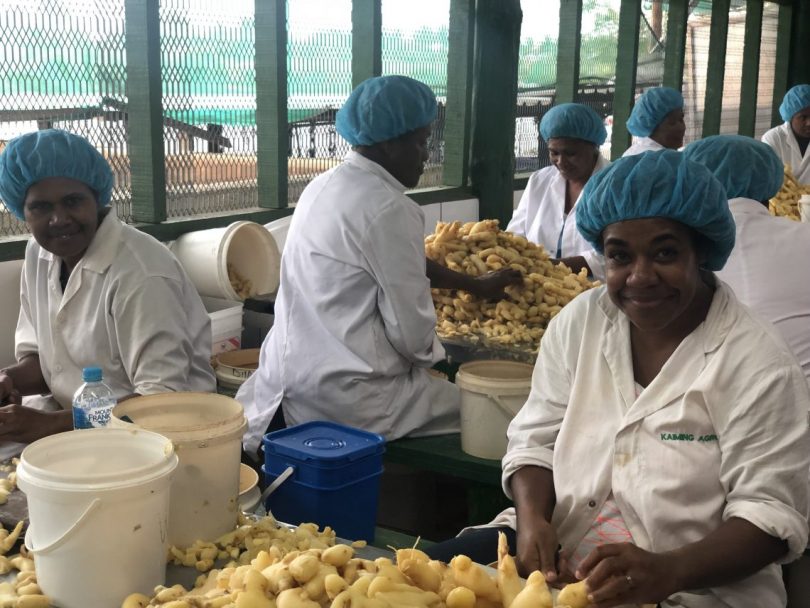For the first time in its eight-year history, the scope of Pacific Trade Invest (PTI) Australia’s Export Survey was expanded to explore the impact of weather patterns on 226 exporters across 16 Pacific Island nations. The survey captures insights on changes in business sentiment within the Pacific private sector.
Through our work, I have observed the impact of tropical cyclones on exporters in the Pacific. That said, the findings from this year’s survey were particularly sobering with 65% of Pacific Island exporters reporting they were negatively impacted by extreme weather during the previous 12 months at the time of being surveyed.
Of these, 41% said extreme weather conditions had a ‘major impact’ on their business, with agriculture the hardest hit. Observations of the weather conditions during the 12-month period were characterised and reported as:
- increased frequency of storms (38% of respondents)
- extreme rainfall (26% of respondents)
- rising air temperature over land (19% of respondents)
- decreased rainfall (17% of respondents)
- increased flooding (16% of respondents)
- prolonged drought (14% of respondents)
- rising sea levels (12% of respondents).
Effects of decreased productivity (56%), damage to crops or products (50%) and an increased cost of supplies (32%) were also reported by the sampling of Pacific exporters.
Responses to the 2020 Pacific Islands Export Survey were received both before and during the COVID-19 global pandemic. Although nearly half of all businesses reported an increase in export orders over the past 12 months, the survey found a quarter of exporters are now reporting a decline in revenue as extreme weather and COVID-19 has affected productivity and disrupted operations.
Given the uncertainty of the economy and immediate future prospects, 27% of respondents expect revenue to decline. Consequently, there has been a significant decline in exporters looking to hire new employees when compared to results from previous years.
There are also signs of optimism, however, particularly among exporters in the manufacturing and agriculture sectors. We know that resilience and optimism are key characteristics of Pacific Islanders. While the pick-up and momentum will be slow, the Pacific will recover. This sentiment was evident in the survey, which found that businesses are pivoting to address the economic and environmental challenges through improved process efficiency, the establishment of new products and services, and enhanced digital marketing (three-quarters of surveyed businesses are using online channels to generate export revenue, a 9% increase from the 2018 survey results).
When global demand returns, I expect to see an immediate increase in business for Pacific Island exporters, and I’m hopeful this will happen in the next 12 months. In the meantime, we must do all we can to support our Pacific neighbours through this recovery. As an organisation, PTI Australia will strengthen its efforts to help exporters grow their online presence by providing data, knowledge, training and technology so that Pacific exports may be able to better withstand the aftershocks, perhaps due to further isolation and lockdown measures in the world as a result of subsequent waves from the COVID-19 pandemic.
More broadly, solutions must be found on key challenges being faced by Pacific Island exporters such as access to affordable online payment solutions, cross-border payments and cost-effective small parcel logistic services. The global PTI network has also launched the Pacific Business Monitor – a series of 15 fortnightly surveys, concluding in December 2020, which aim to capture the evolving sentiment among Pacific businesses on their economic and financial conditions.
Despite the current uncertainty faced by the people and businesses of the Pacific, I retain a great sense of optimism for the future and endorse the sentiments of Jonathan Pryke, Director of the Pacific Islands Program at the Lowy Institute, who writes in the foreword to this year’s report on the Export Survey:
If there is any silver lining to 2020, it’s that Pacific exporters are accustomed to doing it tough … Despite these significant headwinds, many exporters not only prevailed but prospered. Let’s hope that resilience continues in 2020.
Visit the PTI Australia website to access the Pacific Islands Export Survey 2020 full report and highlights.
This post is part of the #COVID-19 and the Pacific series.



Leave a Comment